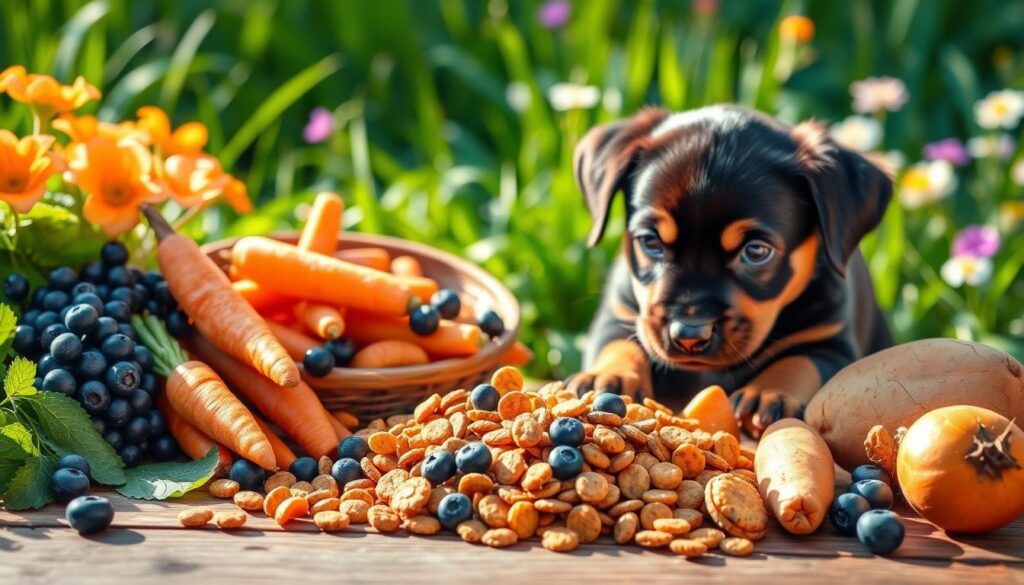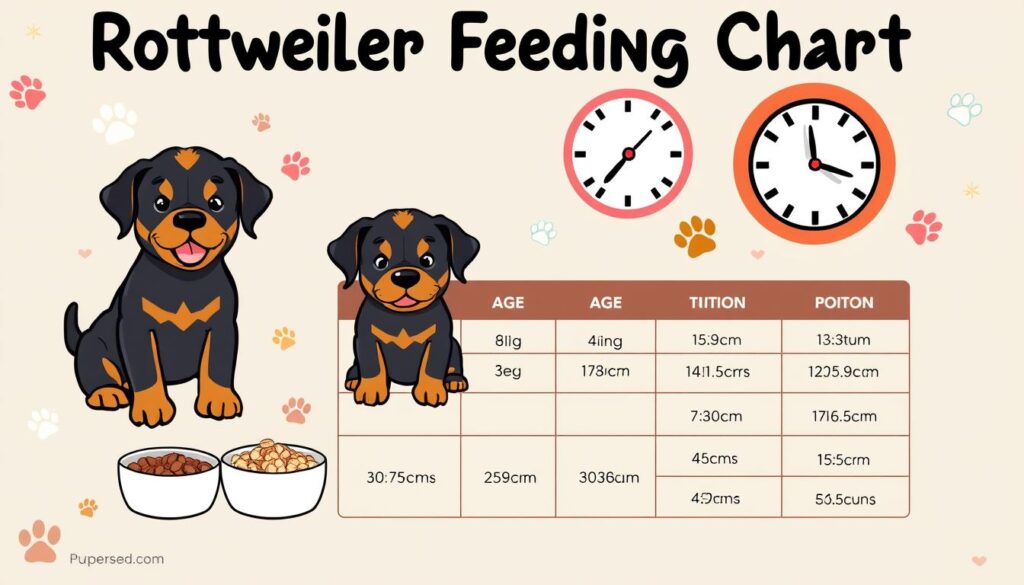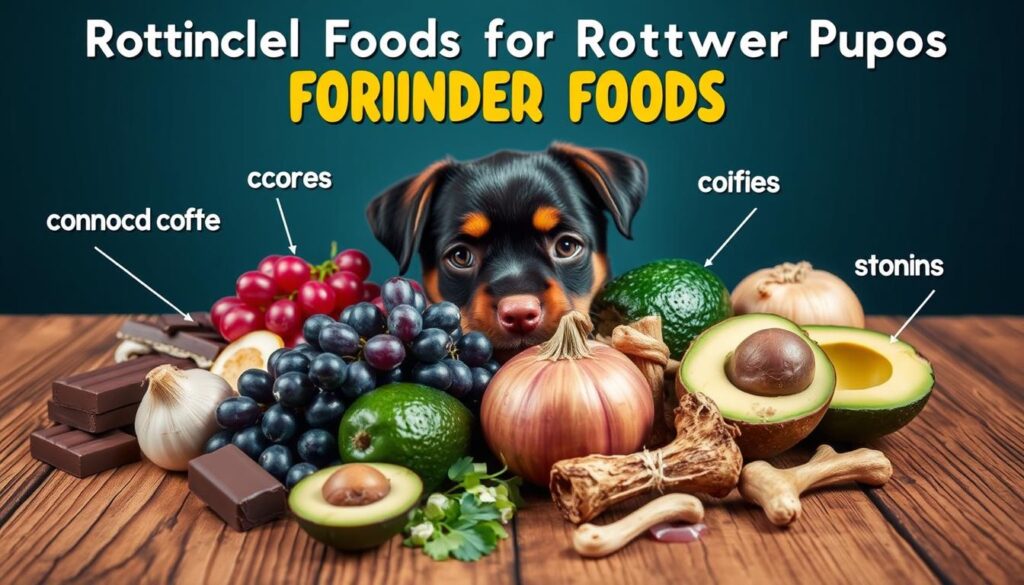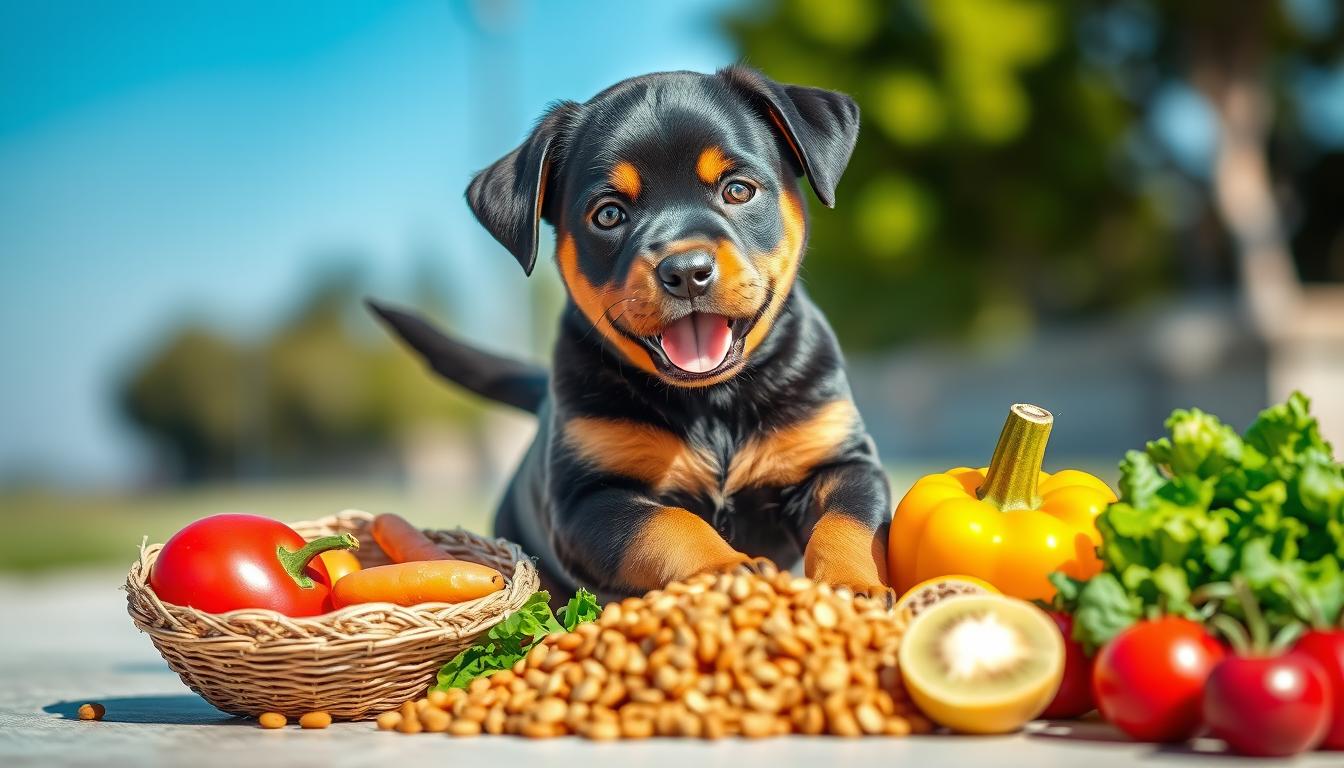Essential Foods for Rottweiler Puppies
Feeding your Rottweiler puppy the right foods is key for their growth and health. As a responsible dog owner, it’s important to give them the best dog foods. A balanced diet helps your puppy grow strong and healthy.
Choosing the right foods for your Rottweiler puppy can seem hard. But with the right help, you can make good choices. We’ll look at the best dog foods for your puppy. These foods should have lots of protein, fats, and minerals and vitamins.
By giving your Rottweiler puppy the best dog foods, you’re helping them stay healthy and happy for life. Whether you’re searching for the best foods for your puppy or just want to learn more, this guide is for you.

Key Takeaways
- Feeding your Rottweiler puppy the right foods is crucial for their growth and health.
- The best dog foods should be rich in protein, essential fats, and vital minerals and vitamins.
- A well-balanced diet will help your puppy develop into a strong and healthy adult dog.
- Choosing the right foods for rottweiler puppies can be overwhelming, but with the right guidance, you can make informed decisions.
- Providing your Rottweiler puppy with the best dog foods will set them up for a lifetime of health and happiness.
Foods for rottweiler puppies should be selected based on their nutritional needs and health status
Understanding Best Foods for Rottweiler Puppies: Nutritional Needs
Rottweiler puppies need a balanced diet to grow right. Their diet should have protein, fats, minerals, and vitamins. This mix is key for their health.
Feeding rottweilerpuppies right is important. Protein helps their muscles grow. They also need essential fats and fatty acids for skin and coat health. Plus, vital minerals and vitamins are crucial for growth.
Protein Requirements for Growing Rottweilers
Rottweiler puppies need lots of protein for growth. Good protein sources are chicken, beef, and fish. A quality puppy food should have the right mix of protein, fats, and carbs.
Essential Fats and Fatty Acids
Essential fats and fatty acids are key for rottweiler puppies. They keep the skin and coat healthy and give energy. Foods like fish oil and flaxseed oil are great sources.
Vital Minerals and Vitamins
Rottweiler puppies need many minerals and vitamins. Calcium and phosphorus are for strong bones. Vitamins A, D, and E help with skin, coat, and immune health. A balanced puppy food should have these nutrients.
Knowing what rottweiler puppies need helps owners feed them well. A well-fed puppy grows into a healthy adult dog. This is good for their happiness and health.
Recommended Foods for Rottweiler Puppies
Finding the right food for Rottweiler puppies is key. They need high-quality protein, fats, and minerals. Top picks include:
- Orijen Puppy Food
- Acana Puppy Food
- Blue Buffalo Puppy Food
These foods use wholesome ingredients. They’re made for growing Rottweiler puppies. They also help prevent digestive problems.
Think about your puppy’s age, size, and activity level. Active puppies need more calories and protein. This supports their growth.
Reading reviews and researching is crucial. Each puppy is different. You need to find the right food for your puppy’s needs.
| Food | Protein Content | Fat Content | Fiber Content |
| Orijen Puppy Food | 38% | 20% | 5% |
| Acana Puppy Food | 33% | 22% | 6% |
| Blue Buffalo Puppy Food | 30% | 18% | 5% |
By understanding your puppy’s needs and researching, you can help them grow. This ensures they live a happy and healthy life.
Commercial vs Homemade Food Options
Choosing the right food for rottweiler puppies is a big decision. Many owners are unsure between commercial and homemade diets. Commercial foods are easy to find and consistent, while homemade diets let you control what your puppy eats.
Commercial foods are convenient and meet your puppy’s nutritional needs. But, they might have fillers that aren’t good for your puppy. Homemade diets let you pick ingredients and avoid allergens. Yet, they can be hard to make and might not be balanced.
Premium Kibble Choices
Premium kibbles are a favorite among pet owners. They have high-quality ingredients and meet your puppy’s needs. Brands like Orijen and Acana offer formulas for different life stages and diets.
Wet Food Benefits
Wet foods, like canned or raw diets, have more moisture and taste better. They’re great for puppies who can’t digest dry kibble or need a varied diet. Brands like Blue Buffalo and Merrick have many formulas and flavors.
Raw Diet Considerations
Raw diets are another choice, but they need careful planning. They’re high in protein and fat but might lack vitamins and minerals. Always talk to a vet or nutritionist before starting a raw diet for your puppy.
The choice between commercial and homemade foods depends on your situation and preferences. Weighing the pros and cons and getting advice from a vet or nutritionist helps make the best choice for your puppy.
| Food Type | Benefits | Drawbacks |
| Commercial | Convenient, consistent | May contain fillers and by-products |
| Homemade | Control over ingredients, tailored to individual needs | Time-consuming, potential for nutritional imbalances |
| Raw | High in protein and fat, palatable | May be low in essential vitamins and minerals, risk of bacterial contamination |
Feeding Schedule and Portion Control
It’s important to have a feeding schedule and control portions for rottweiler puppies. This helps them grow healthy and strong. A good feeding plan stops them from eating too much or too little, which can lead to health problems.

Rottweiler puppies need a balanced diet. A feeding schedule makes sure they get the right amount of food at the right time. This is key for their growth and health.
For portion control, watch how much your puppy eats and adjust as needed. Puppies grow at different rates and need different amounts of food. Feed them 3-4 times a day until they’re about six months old. Then, switch to twice a day. The goal is to find the perfect balance.
Here are some tips for a good feeding schedule and portion control for rottweiler puppies:
- Feed puppies at the same time every day to establish a routine
- Monitor food intake and adjust portion sizes based on individual needs
- Gradually switch from 3-4 times a day to twice a day as puppies mature
- Consult with a veterinarian to determine the best feeding schedule and portion control for your rottweiler puppy
By following these tips, you can help your rottweiler puppy grow into a healthy adult dog. Always talk to a vet for advice on feeding your puppy.
| Age | Feeding Frequency | Portion Size |
| 6-8 weeks | 3-4 times a day | 1/4 to 1/2 cup per 10 pounds of body weight |
| 3-6 months | 3-4 times a day | 1/2 to 3/4 cup per 10 pounds of body weight |
| 6-12 months | 2 times a day | 3/4 to 1 cup per 10 pounds of body weight |
Special Dietary Considerations for Large Breed Puppies
As a rottweiler puppy owner, it’s key to think about their special diet needs. Large breed puppies need the right food to avoid health problems. They need a diet that helps them grow well without harming their bones and joints.
It’s important to control their growth. Feeding them the right amount of food helps avoid obesity and health issues. Also, a diet rich in nutrients like glucosamine and chondroitin supports their joint health. This helps prevent arthritis and keeps their joints healthy.
Growth Rate Management
- Feed a balanced diet that meets their nutritional needs
- Avoid overfeeding to prevent obesity
- Monitor their growth rate and adjust their diet accordingly
Joint Health Support
Supporting joint health through diet is crucial for large breed puppies. Adding supplements like glucosamine and chondroitin to their food is helpful. This way, you can ensure their joints stay healthy and prevent arthritis.
Weight Management Tips
Keeping a healthy weight is vital for rottweiler puppies. This can be done by feeding them a balanced diet and watching their food intake. By doing this, you can prevent obesity and related health issues, ensuring they live a happy and healthy life.
Foods to Avoid for Your Rottweiler Puppy
As a responsible Rottweiler puppy owner, knowing what foods to avoid is key. Some foods can be toxic or cause allergies. Always check food labels and make smart choices.
Chocolate, grapes, and onions are bad for your puppy. They can make them sick. Also, avoid foods with beef, dairy, and soy because they can cause allergies. Foods with lots of fillers, by-products, and artificial preservatives are also not good.

Harmful Ingredients
- Chocolate: contains theobromine, which can be toxic to dogs
- Grapes: can cause kidney failure in dogs
- Onions: can cause anemia and damage to a dog’s red blood cells
Common Food Allergens
- Beef: a common protein source that can cause allergic reactions
- Dairy: can cause digestive issues and allergic reactions in some dogs
- Soy: can cause allergic reactions and digestive issues in some dogs
Knowing what to avoid helps keep your puppy safe and healthy. Always talk to your vet for the best diet advice.
Feeding your Rottweiler puppy a balanced diet is crucial. Avoiding harmful foods and allergens helps them grow well. Make smart food choices for your puppy’s health.
| Foods to Avoid | Reason |
| Chocolate | Toxic to dogs |
| Grapes | Can cause kidney failure |
| Onions | Can cause anemia and damage to red blood cells |
Transitioning Between Different Foods
When it comes to transitioning foods for rottweiler puppies, it’s key to do it slowly. This helps avoid upset stomachs. It might be tough, but with the right steps, you can make the change easy for your puppy.
To begin, mix the old food with the new one, slowly adding more new food. This can take 7-10 days, based on your puppy’s needs. Here are some important tips for transitioning foods for rottweiler puppies:
- Start by mixing 25% new food with 75% old food
- Gradually increase the proportion of new food every few days
- Monitor your puppy’s health and adjust the transition period as needed
Choosing a high-quality food is also crucial. Look for one that’s full of protein, fat, and complex carbs. It should be made for large breed puppies like Rottweilers. By following these tips and transitioning foods for rottweiler puppies slowly, you can help your puppy stay healthy and happy.
Check : Can Rottweilers Handle Cold Weather
A well-nourished Rottweiler puppy shows clear signs of good health. These signs are important for owners to notice. They help spot any nutritional problems or health issues early.
Look for a shiny coat, healthy weight, and strong muscles. High energy and alertness are also good signs. Reaching the right size at the right age is another key indicator.
Physical Indicators
- A shiny, healthy-looking coat
- Healthy weight and body condition
- Robust muscle tone and strong bones
Behavioral Signs
- High energy levels and playfulness
- Alertness and responsiveness to surroundings
- Good appetite and interest in food
Growth Milestones
| Age | Expected Weight | Expected Height |
| 8 weeks | 10-15 pounds | 8-10 inches |
| 16 weeks | 25-35 pounds | 12-14 inches |
| 6 months | 50-65 pounds | 18-20 inches |
Common Feeding Mistakes to Avoid
As a Rottweiler puppy owner, knowing common feeding mistakes is key. Overfeeding and underfeeding can harm your pet’s health. These mistakes can lead to malnutrition and health problems. It’s important to steer clear of them.
Some common feeding mistakes for rottweiler puppies include:
- Feeding table scraps, which can lead to obesity and other health issues
- Not providing a balanced diet, which can result in nutritional deficiencies
- Overfeeding, which can cause rapid growth and lead to joint problems
To avoid these mistakes, you need to plan carefully. A balanced and nutritious diet is crucial. It helps your Rottweiler puppy grow into a healthy adult dog.
Every dog is unique, and what works for one may not work for another. Always consult with your vet. They can help you find the best diet for your pet and avoid common mistakes.
Conclusion: Ensuring Your Rottweiler Puppy’s Nutritional Success
Raising a Rottweiler puppy is a rewarding journey. Proper nutrition is key for their health and growth. This guide has covered the dietary needs, recommended foods, and best practices for your puppy’s well-being.
A balanced diet is vital for your puppy’s growth and health. It should include high-quality protein, fats, and vitamins. Following the feeding guidelines and considering special diets will help your puppy stay healthy and active.
Your commitment to your puppy’s nutrition will pay off. You’ll have a happy, healthy, and energetic companion. With the knowledge from this guide, you’re ready to ensure your Rottweiler puppy’s nutritional success.
FAQ
What are the best foods for Rottweiler puppies?
The best foods for Rottweiler puppies are high-quality commercial dog foods. These are made for large-breed or all-life-stage puppies. They provide the right mix of protein, fats, vitamins, and minerals for growth.
How much should I feed my Rottweiler puppy?
The food amount for your Rottweiler puppy depends on their age, size, and activity level. Follow the feeding instructions on the dog food packaging. Adjust the portions as needed to keep a healthy weight. Avoid overfeeding or underfeeding.
What are the nutritional needs of Rottweiler puppies?
Rottweiler puppies need specific nutrients for growth. They need high-quality protein for muscles, essential fats for skin and coat, and key vitamins and minerals. These include calcium, phosphorus, and zinc for strong bones and health.
Should I feed my Rottweiler puppy a homemade diet?
Homemade diets can work for Rottweiler puppies if planned well. But, it’s hard to balance the diet on your own. It’s best to consult a veterinary nutritionist for a homemade diet plan.
What foods should I avoid feeding my Rottweiler puppy?
Avoid harmful foods like chocolate, grapes, onions, and foods high in fat or salt. Also, skip artificial preservatives, colors, and fillers that are hard for puppies to digest.
How do I transition my Rottweiler puppy to a new food?
Transition your Rottweiler puppy to a new food gradually. Start by mixing a small amount of the new food with the old. Increase the new food ratio over several days or a week. This prevents digestive upset and helps the puppy adjust.
How can I tell if my Rottweiler puppy is getting the right nutrition?
Good nutrition in Rottweiler puppies shows in a shiny coat, steady weight gain, and lots of energy. If your puppy’s coat looks dull, they seem tired, or grow slowly, their diet might need a change.





